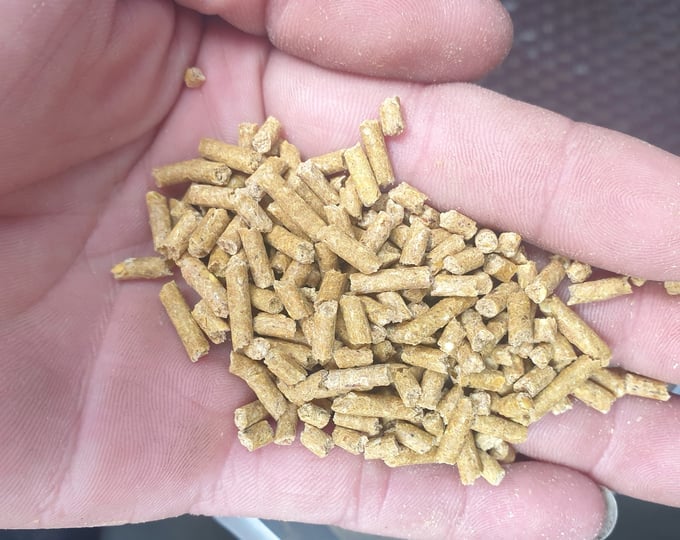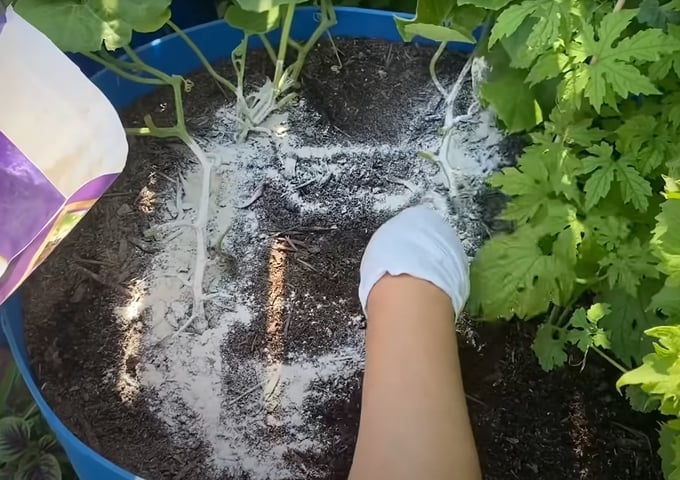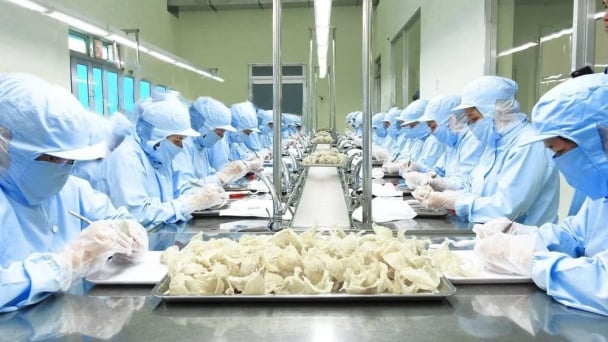May 16, 2025 | 12:28 GMT +7
May 16, 2025 | 12:28 GMT +7
Hotline: 0913.378.918
May 16, 2025 | 12:28 GMT +7
Hotline: 0913.378.918

Animal feed currently still uses many ingredients of animal origin. Photo: Son Trang.
The Vietnamese animal feed industry heavily relies on animal-derived raw materials, with meat meal and meat bone meal representing the largest imported volumes. In 2022, Vietnam imported a substantial 787,000 tons of these materials, valued at $433 million—an 18% increase in volume and nearly 33% increase in value compared to 2021. This accounts for 7.6% in volume and 7.8% in value of the total imports of animal feed and raw materials to Vietnam, as reported by the General Department of Customs.
The average import price for meat meal and meat bone meal in 2022 stood at $551 per ton, marking a 12% rise from the previous year. The primary suppliers of these materials are the United States and the European Union.
Professor Dr. La Van Kinh, Vice President of the Vietnam Animal Feed Association, highlighted that in developed countries, meat powder and meat bone powder are processed from 49% of the live weight of cattle (utilizing non-edible parts), 44% of the live weight of pigs, and 37% of the live weight of chickens and ducks.
Notably, the raw materials for producing meat powder and meat bone powder consist of over 60% water, 20% protein and minerals, and 20% fat. However, these raw materials are perishable, harbor numerous harmful microorganisms, and can potentially spread diseases to both humans and animals. It's imperative to scrutinize their usage in animal feed to mitigate these risks and uphold food safety standards.
The processing of meat bone meal (MBM) materials carries a substantial microbial content, as revealed by scientific reports. Clostridium Perfringen was detected in 71% of raw materials for processing meat powder and meat and bone powder; Listeria strains in 76.2%; L. Monocytogenes in 8.3%; Campylobacter strains in 29.8%; C. jejuni in 20%; and Salmonella strains in 84.5%.
MBM poses the risk of transmitting serious diseases such as mad cow disease and foot-and-mouth disease to buffaloes and cows. For pigs, MBM can be a vector for diseases like blue ear disease, African swine fever, foot-and-mouth disease, and acute diarrhea, among others. To ensure disease safety for livestock and maintain food safety standards for humans, numerous countries worldwide have prohibited the use of meat meal and meat and bone meal as animal feed.
France, for instance, has banned the use of MBM in cow feed since 1990. Across the European Union, the use of MBM in ruminant feed has been banned since 1994, and its application in all types of animal feed has been prohibited since 2001.

In many countries, meat meal and meat bone meal are no longer used in animal feed but are used as fuel and fertilizer. Photo: Son Trang.
In response to these concerns, many countries have repurposed meat meal and meat bone meal as fertilizer and fuel due to their affordability. In the UK, MBM serves as fuel for power plants and cement production. The combustion process effectively eliminates harmful microorganisms and pollutants, and the energy value of MBM is two-thirds that of coal. Additionally, MBM is utilized as fertilizer, with bone meal providing calcium and phosphorus, and meat meal contributing protein.
In Vietnam, regulations currently exist for the content of arsenic, cadmium, lead, ammonia nitrogen, ethoxyquin, E. coli, and Salmonella in meat powder and meat bone powder. However, there are no regulations governing the testing for bacteria and viruses that cause infectious diseases in animals.
Faced with this reality, Professor Dr. La Van Kinh raises a critical question: Should our country consider regulations prohibiting the use of meat powder and meat bone powder as animal feed to minimize the risk of diseases in livestock? While awaiting changes in regulations, there is a pressing need to impose regulations on the use of meat meal and meat bone meal as food for ruminants (buffaloes, beef cattle, dairy cows, goats, sheep). Simultaneously, technical requirements for testing bacteria and viruses that cause infectious diseases in animals should be incorporated into the standards for imported meat powder and meat bone powder.
Addressing these concerns in Vietnam is paramount not only for the health and safety of livestock but also for the preservation of food safety standards and public health.
Translated by Quynh Chi

(VAN) Japan's efforts to lower the price of rice through the release of its stockpile may finally be making some progress, albeit at a snail's pace.

(VAN) U.S. tariffs are not only a 'shock', but also an opportunity for Vietnamese businesses to renew their mindset toward comprehensive development.

(VAN) As Bac Giang lychee enters the harvest season, Minister Do Duc Duy expects that the fruit will contribute greatly to agricultural exports due to standardized production and deep processing.

(VAN) Consumers have shown a preference for free-range eggs, but those farming systems are more vulnerable to biosecurity risks like bird flu.
/2025/05/09/5701-1-184335_301.jpg)
(VAN) Vietnam’s eel exports nearly doubled thanks to a mud-free farming model, opening up new prospects while still facing numerous barriers related to international standards.

(VAN) Minister Do Duc Duy warned that if production is not professionalized and supply chains are not transparent, the U.S. market could become a growth bottleneck.

(VAN) Delegating surveillance responsibilities to local authorities is a cost-saving and efficiency-boosting measure that removes a key bottleneck for enterprises, according to Director General Duong Tat Thang.